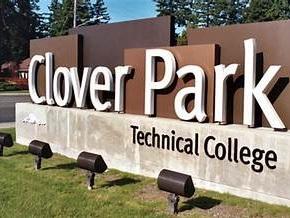Clover Park Technical College
Mentorship, Motivation, and Cyber Education
Clover Park Technical College (CPTC) stands out as a leader in cybersecurity education, offering a range of programs designed to equip students for high-demand roles in an evolving industry. From foundational associate degrees to cutting-edge bachelor’s programs, CPTC provides a clear pathway for aspiring cybersecurity professionals.
Comprehensive Cybersecurity Degrees
Many industry experts agree that a solid understanding of networking is a fundamental requirement for cyber defenders. CPTC heard that message loud and clear when they designed these program offerings:
- Bachelor of Applied Science in Cybersecurity
- Bachelor of Applied Science in Cyber-Physical Software Engineering
- Associate in Applied Science Transfer - Network Operations & Systems Security
- Associate of Applied Technology - Network Operations & Systems Security
- Certificate - Network Operations & System Security Professional
The Network Operations & System Security (NOS) programs lay the groundwork for careers in help desk, network administration, and cybersecurity across many industries. Students gain skills in building secure networks, detecting and mitigating threats, and implementing both physical and virtual security measures. The “Transfer” Associate degree provides a seamless transition to CPTC’s bachelor’s programs.
Bachelor’s degree students benefit from hybrid formats with weekend sessions, catering to working adults. The curriculum covers advanced topics like penetration testing, cybersecurity architecture, incident response, project management, and cyber ethics. This well-rounded approach along with technical deep dives ensure graduates are prepared for the demands of the field.
Innovation in Education: Cyber-Physical Software Engineering
CPTC recently launched the Bachelor of Applied Science in Cyber-Physical Software Engineering. This program prepares students to become software developers for industries leveraging robotics, Internet of Things (IoT), and industrial control systems. Ethical practices, secure software development, and a strong focus on the software development lifecycle are cornerstones of the curriculum.
A Collaborative and Supportive Learning Environment
CPTC fosters a diverse and dynamic learning environment, brining together students from various backgrounds, including high school graduates, career changers, and individuals from diverse cultural perspectives. This mix enhances the learning experience by:
- Incorporating fresh enthusiasm and tech-savvy skills from younger students.
- Leveraging the resilience, life experience, and mentorship of older students.
- Encouraging discussions on ethics, integrity, and the responsible use of technology.
“The cross-generational dynamic fosters mutual growth,” says Catherine Morris, a Computer Technology instructor at CPTC. “Students not only learn from instructors but from each other’s unique perspectives and experiences.”
Collaboration extends beyond the classroom, as cybersecurity students share spaces and ideas with peers from mechatronics, software development, and manufacturing programs. Clubs and interdisciplinary discussions expose students to niche career possibilities and broaden their understanding of the tech landscape.
Building a Strong Pipeline: The Pierce County Skills Center Partnership
CPTC partners with the Pierce County Skills Center to prepare high school students for college-level cybersecurity programs. Instructor Adam Scroggins plays a key role in inspiring and equipping students with foundational knowledge, hardware skills, and even resumes before they graduate high school.
“Adam’s program is a game-changer,” says Morris. “These students enter the NOS program confident and focused, knowing exactly what they want to achieve. Their passion energizes the entire classroom. If I could package Adam’s program I’d offer it as a gift to all high schools.”
Through initiatives like SkillsUSA and the Pacific Rim Collegiate Cyber Defense Competition (PRCCDC), students gain hands-on experience in cyber challenges, networking, and hardware troubleshooting. CPTC helps their students to participate in these and other competitions. Graduates who have these marks of honor on their resume have increased power in the job hunt.
Career Changers Welcome
CPTC’s programs attract many career changers, from those with minimal computer experience to seasoned professionals seeking new opportunities. “We have a huge re-training workforce,” says Morris. “Everyone is welcomed and upskilled as needed. Success is determined by your attitude and determination, not by your past experiences.”
Students transitioning from industries like construction or retail often discover that their problem-solving skills and work ethic translate well to cybersecurity roles. Successful students are resilient, driven by curiosity and a desire to learn.
Challenges and Opportunities
While CPTC’s programs are robust, students often face challenges such as:
First-quarter overwhelm: The transition from high school or a non-technical career can be daunting.
Commitment to the field: Success requires fully embracing the goal of becoming a cybersecurity professional.
To address these challenges, CPTC emphasizes mentorship and peer support. Experienced students often guide newcomers, sharing words of encouragement and practical advice.
Preparing for a Cybersecurity Career
CPTC graduates are equipped to pursue roles in network security, software development, and more. However, navigating the job market presents its own challenges. Many job postings require a long list of, credentials, degrees, and skills. This can discourage even the most qualified graduates from applying. These employers miss out on potential cyber defense superheroes emerging from college with fresh perspectives and the drive to make a difference.
To further support students, Morris calls for more industry engagement in providing structured internships and communities of support that extend beyond the classroom. Examples include hackathons, industry meetups, job fairs, and formalized mentorship programs like WiCyc. Employers should encourage their IT and cybersecurity professionals to participate in such events. By fostering the next generation of cyber-defenders, industry leaders build a robust hiring pipeline for themselves and for the industry as a whole.
Morris states: “While the college environment lays the foundation, it’s the combination of different learning spaces and communities that truly shapes a well-rounded professional.”
Summary
Clover Park Technical College’s cybersecurity programs are more than just an education—they’re a launchpad for future professionals. With a focus on mentorship, practical skills, and a collaborative learning environment, CPTC is shaping the next generation of cyber experts.



